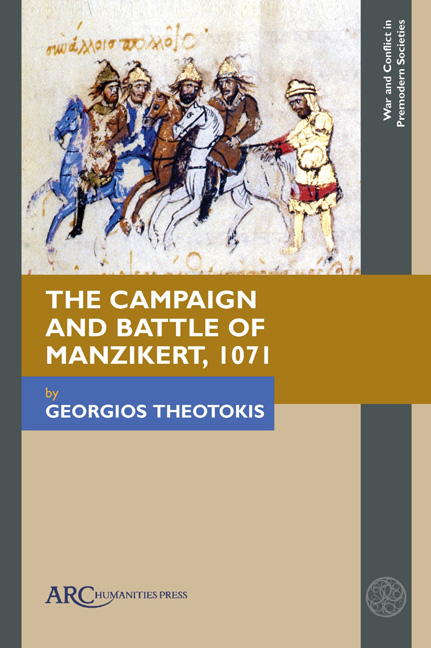Book contents
- Frontmatter
- Dedication
- Contents
- List of Illustrations
- Introduction
- Chapter 1 Christian and Muslim Sources for the Battle of Manzikert: Making Sense of the Professional and Cultural Milieu
- Chapter 2 Christian and Muslim Sources for the Battle of Manzikert: Making Sense of the “Battle-Piece"
- Chapter 3 Christian and Muslim Sources for the Battle of Manzikert: Making Sense of Numbers and Local Topography
- Chapter 4 The Geopolitical and Military Background to the Battle of Manzikert
- Chapter 5 The Prelude to the Battle of Manzikert
- Chapter 6 The Battle of Manzikert
- Chapter 7 The Aftermath of the Battle of Manzikert
- Conclusions
- Select Bibliography
- Index
Chapter 1 - Christian and Muslim Sources for the Battle of Manzikert: Making Sense of the Professional and Cultural Milieu
Published online by Cambridge University Press: 08 May 2024
- Frontmatter
- Dedication
- Contents
- List of Illustrations
- Introduction
- Chapter 1 Christian and Muslim Sources for the Battle of Manzikert: Making Sense of the Professional and Cultural Milieu
- Chapter 2 Christian and Muslim Sources for the Battle of Manzikert: Making Sense of the “Battle-Piece"
- Chapter 3 Christian and Muslim Sources for the Battle of Manzikert: Making Sense of Numbers and Local Topography
- Chapter 4 The Geopolitical and Military Background to the Battle of Manzikert
- Chapter 5 The Prelude to the Battle of Manzikert
- Chapter 6 The Battle of Manzikert
- Chapter 7 The Aftermath of the Battle of Manzikert
- Conclusions
- Select Bibliography
- Index
Summary
HAVING A WIDE variety of primary sources at a historian's disposal can be a blessing or a curse, depending on how ready one is to peel away the multiple layers of “literary goals” and “‘political agendas” to reach “true history” (as opposed to Anthony Kaldellis's “unhistory”). A historian writing about the Battle of Manzikert, therefore, must tackle a dizzying array of sources not only from both the Chalcedonian and the non-Chalcedonian historiographic traditions but also from the medieval Arabic and Persian ones. Some of them were contemporaries to the events they describe, which means they had access to stories and evidence from the recent past, while others repeated well-established historical episodes for didactic and/or propagandistic purposes several centuries after the battle; some of them were (high-ranking) civil servants, while others were religious scholars and famous preachers.
To answer the question of how we are to write the history of the Battle of Manzikert in light of what we know about our sources, we should appreciate their accounts not as collections of “facts” that can be understood as being either true or false, but rather as “literary artefacts” with their own aims, skills and aesthetic.” Or, as Stamatina McGrath aptly put it, “the act of composing history should be understood as a deliberate, political act with the intention of influencing how the past would inform the present and future concerns of the authors, their patrons, and their worlds.” Therefore, to be able to read and better evaluate the battle-narrative of another author, we need to be able to understand the frame of reference with which the author constructed narratives. Accordingly, this chapter will refer to some basic points in our authors’ social and educational backgrounds, the date and place of the compilation of their works, their own sources and the way they collected their information. I will try to make sense of their biases and sympathies, and how far their “socio-political agendas” shaped accounts, paying particular attention to their treatment of the personalities and reigns of Emperor Romanos and his successors, Michael VII and Nikephoros III.
- Type
- Chapter
- Information
- The Campaign and Battle of Manzikert, 1071 , pp. 1 - 22Publisher: Amsterdam University PressPrint publication year: 2024



